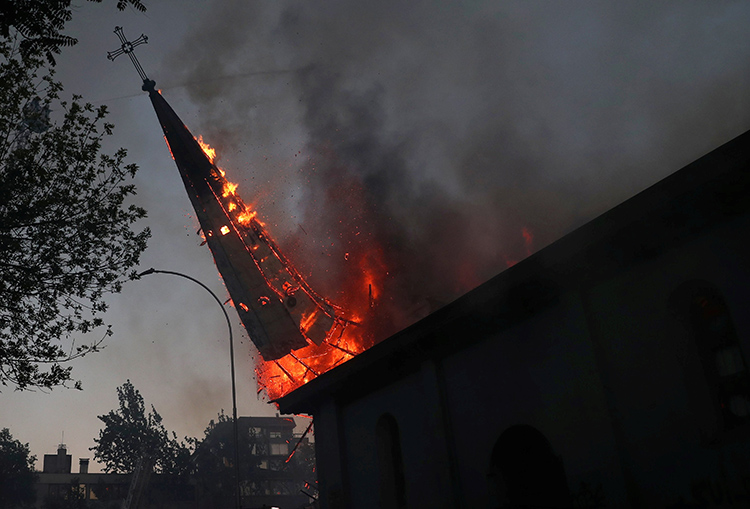"A shadow fell over the honor of the police. All its members knew that they were forbidden to use their weapons, but that weapons could be used against them. They knew that several of them had been badly wounded at various points in the capital. And they were expected to stand at isolated points, targets for all kinds of projectiles, while the troops stood aside and the masses became aware of the absence of the state.". Any Chilean reading this might think that it is a description of the violence unleashed on Sunday, October 18, 2020, in the so-called "Ground Zero" of Santiago. But no: they are the words with which Alexander Solzhenitsyn describes what happened in Russia, in March 1917 (cfr. "The Red Wheel"). A mere coincidence?
Pain and perplexity
Pain, perplexity, impotence: these are the feelings that the vast majority of the inhabitants of Chile experienced this Sunday, when they saw two Catholic churches desecrated and burned. The same feelings that exactly one year ago shook us when, simultaneously, several Metro stations and some temples burned, while the lumpen looted supermarkets in the outskirts of the capital. In the following days, these images were replicated in the main cities. The trigger was the increase of 30 pesos (4 cents on the dollar) in public transportation and the call of students, the extreme left and some unions to evade payment. When we were able to recover from the knock outThe phenomenon was called a "social outburst" and, according to some media reports, was due to the accumulated rage of a sense of abuse and inequality of the most dispossessed sectors of society.
We were again surprised when, in the following days, massive demonstrations -some close to or exceeding one million people- took place, of a predominantly peaceful nature. They reflected a generalized but somewhat confused discontent. Posters were raised against politicians, the pension system, male chauvinism, animal abuse, environmental pollution, highway fees... and in favor of free abortion, sex education without taboos, vegan food, homosexual marriage... Periodically, violent attacks on private and public property, looting of supermarkets, burning of university campuses... returned.
Spontaneous?
The explanation of a "spontaneous outburst" did not seem credible. Citizens began to demand that the authorities impose order. The head of the Investigative Police went so far as to declare that he had a lot of information about what happened on October 18 and that it would soon be made public. We are still waiting. A state of siege was decreed, the military took to the streets and there were intervals of calm. But the military were stationed at strategic points, without intervening, while the Carabineros police bore the brunt of the situation, confronting violent groups with an urban guerrilla organization with bare hands.
In mid-November violence broke out again, while in Parliament the political center practically disappeared. The left demanded the resignation of President Piñera. When the specter of civil war began to loom, a glimmer of hope emerged: on November 15, 2019, the political forces - excluding the Communist Party and another extreme left-wing party - signed the "Agreement for Social Peace and the New Constitution".
It was then that the silent majority learned that the first priority was a Constitution to re-found Chile. A plebiscite was set for April 2020, but Covid forced it to be postponed to October 25.
Climate of polarization
2020 has been a surrealist nightmare: pandemic, quarantine, deconfinement, return of violent demonstrations on Fridays in Plaza Baquedano. Anniversary of the "social explosion". For that day, the Teachers' College, which refused to resume classes for fear of coronavirus outbreaks, called for a march... Of course, with a mask.
And so we are: with a level of polarization not seen since the October 1988 plebiscite, which decided the end of Pinochet's military regime. With a minority, but very virulent, cocktail of anarchists-riotous gangs-narco-traffickers who are out to destroy everything in their path. Two of them became sadly famous because they put a bomb in the Basilica del Pilar in Zaragoza (they have already served their sentence in Spain and are back). On the other hand, the public forces are overwhelmed: internal and international human rights organizations do not allow them to act.
It does not seem the best climate to start a constituent process. But the Virgin of Carmen, Patroness of Chile, has taken us out of worse situations.








